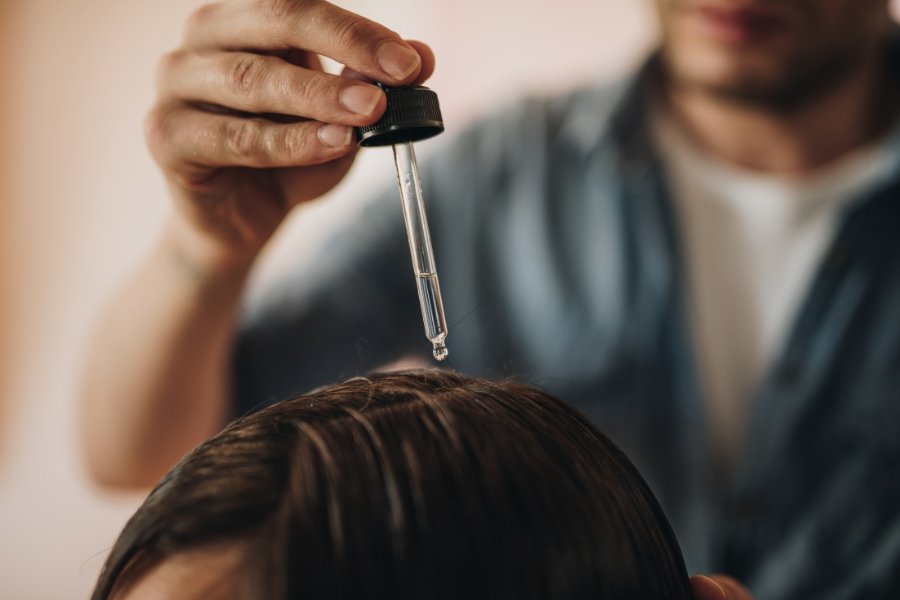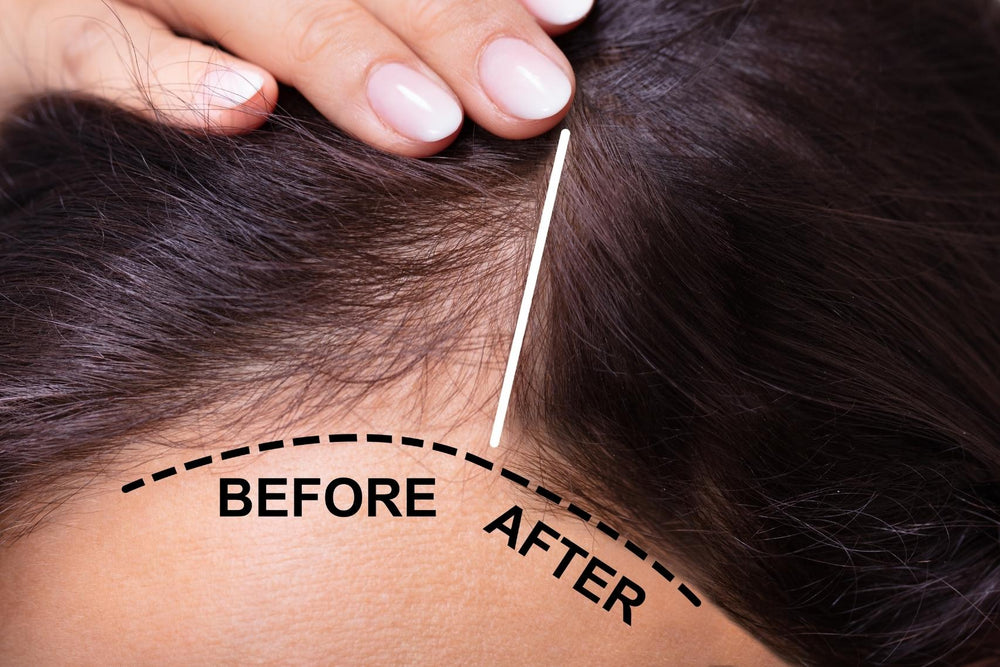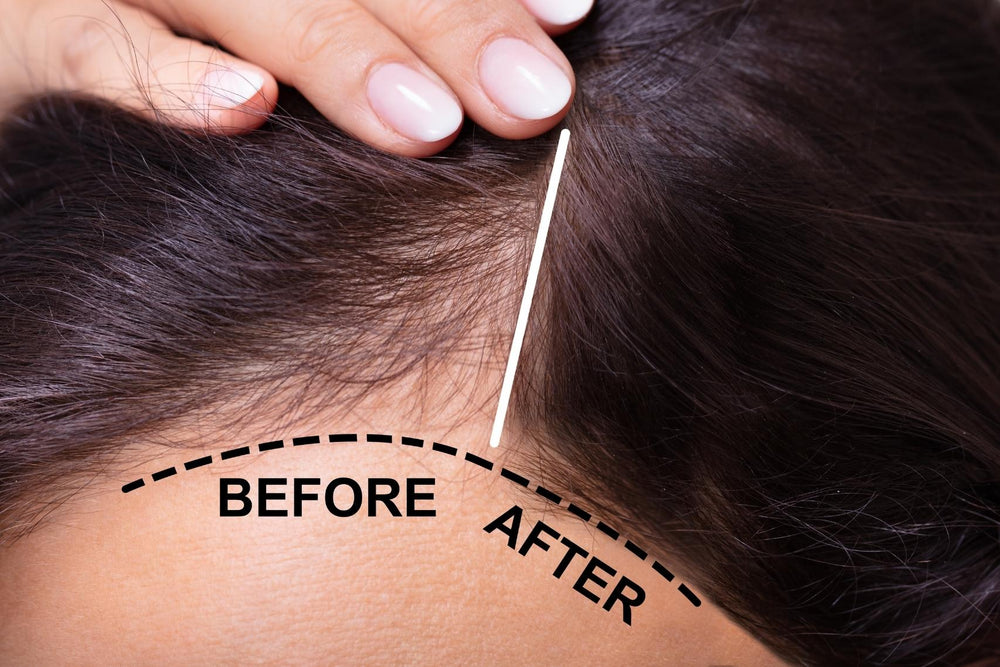Causes of Thinning Hair In Women
Experiencing hair thinning is extremely emotional. Perhaps even more so for women – it’s our crown. We get used to the familiar 50-100 hairs a day that we find on our clothing or hairbrushes. Yet, when we look in the mirror one day and see more of our scalp, we start to worry.
There can be many factors that cause hair loss in women. Hair loss can occur suddenly – usually triggered by an event. Generally, hair loss that comes on suddenly doesn’t require prescribed treatment since the hair will be restored as the body recovers from the event.
On the other hand, hair loss can occur gradually and slowly. This is often noticed as a widening of the middle part, or overall increased hair thinning. A type of gradual hair thinning is hereditary hair loss (androgenic alopecia). This means the genes have been inherited from your parents or grandparents. This type of hair loss responds well to treatment. The earlier treatment begins, the more successful it can be. If you’re uncertain as to the cause, you may want to consult with a dermatologist. It’s possible there may be an underlying medical issue that needs to be addressed.
Understanding the cause of your hair loss is key to knowing how to proceed. Let’s explore known causes for both sudden and gradual hair loss.
SUDDEN HAIR LOSS IN WOMEN
The sudden onset of hair loss is usually caused by an event. These might include childbirth, medications, stress, illness, or sudden trauma. This type of hair loss is called telogen effluvium - the abrupt onset of hair shedding noticed 3 months after a triggering event.
In the normal hair cycle of growth and rest, the telogen phase (or resting stage) is generally 2-3 months. According to the National Library of Medicine, when the metabolism is altered, this influences the biological clock in many follicles to descend prematurely into the ‘resting phase’ at the same time.
Alternatively, there may be an underlying medical issue that your doctor can advise you on.
HAIR LOSS AFTER CHILDBIRTH
After giving birth, our body's hormone levels return to what they were prior to pregnancy. Our hair growth cycles begin to change. The hormonal changes can cause more hairs than normal to go into the ‘resting’ phase. In this case, more hair fall is noticeable.
Postpartum hair loss is not usually cause for worry, nor is it permanent. If the fullness of your hair has not returned after a year, you may choose to check with your doctor for low iron levels or thyroid issues that may be an underlying cause.
HAIR LOSS WHILE TAKING MEDICATIONS
Certain medications can cause hair loss because they interfere with the normal hair growth cycle and pattern. This type of hair loss is often temporary since the full state of hair will return when the medication is stopped.
However, if your medication is for a chronic ailment, then using a scalp treatment to nourish your roots will aid in a healthier scalp. This is also true for those who finish chemotherapy. Your hair will likely return to its natural state, although the texture and colour may change. Adding nutrients directly to the follicles will help the hair grow healthy hair.
HAIR LOSS CAUSED BY STRESS
Stress is another cause of sudden hair loss in women. When our bodies are feeling ‘under attack’, our systems will protect each other.
“Long-term chronic stress can affect hormone levels in the body, especially cortisol and other stress hormones,” says Dr. Patrick C. Angelos, facial plastic and reconstructive surgeon and author of “The Science and Art of Hair Restoration: A Patient’s Guide.” In turn, “hair loss is affected by those fluctuations in hormone levels,” he adds.
This “chronic, unmitigated stress can potentially lead to more hair loss than you might get with just your genetics and ageing alone,” he adds.
In this process, “basically your body is diverting its energy away from non-essential functions like hair growth to more essential things as a survival mechanism,” Angelos explains.
Speaking of stress, which of us could have foreseen the effects of the pandemic on our emotional and mental health? The stress felt over the past two years of isolation from friends and family or the uncertainty of life has taken its toll on our well-being.
We didn’t have to test positive for Covid-19 to feel the stress that came as our ‘normal’ took on a new form. With this prolonged stress, added to other stresses in life, the hair follicles will often go into the resting phase. As such, you will experience much more hair loss than normal.
HAIR LOSS CAUSED BY COVID-19 AND OTHER ILLNESSES
Like the effects of stress - illness can take its toll on your scalp and hair growth. Covid-19 hair loss or pandemic hair loss is often spoken of.
For those who tested positive for Covid-19 many reported having a high fever. The after-effects of Covid-19 can remain for weeks or months, as many have commented. This has become known as ‘long-Covid.'
In an interview with Woman’s Day, dermatologic surgeon Dr. Dendy Engelman said she started seeing more patients presenting with hair loss four to six weeks after the initial stay-at-home orders in New York City.
Dr. Engelman says that “high fevers as well as emotional and physical stressors” will trigger the hair loss she has seen in patients.
“It can take four to six months to cycle back to the normal growth phase," she explains. Doctors will try to look at other underlying conditions with blood work, thyroid function, hormones and iron levels. Checking levels of micronutrients like zinc and B12 are important to ensure they are within normal levels. If there is no underlying reason for the hair loss, then additional supplements or topical treatments can be suggested to help the scalp regain its normal growth cycle and promote regrowth.
In an interview with Woman’s Day, Dr. Daniel Belkin, of the New York Dermatology Group said that this recovery timeline remains the same, regardless of what causes the hair loss in the first place. “Whether you are experiencing telogen effluvium because of a sickness or psychological stress, the timeline is the same,” Dr. Belkin says. “Generally it takes three months after the stressful event to start seeing hair loss and it presents itself in the same way.”
Click on the link to learn about how can thinning hair in women be treated? Effective treatment can help improve hair follicles and prevent further damage.














